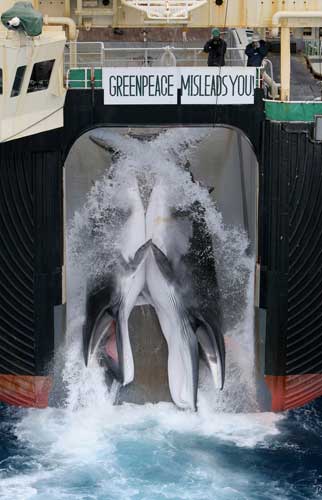Save the whale (again): Secret plan to lift hunting ban
Twenty years ago, commercial whaling was outlawed. But hush-hush meetings between officials have paved the way for its return

Your support helps us to tell the story
From reproductive rights to climate change to Big Tech, The Independent is on the ground when the story is developing. Whether it's investigating the financials of Elon Musk's pro-Trump PAC or producing our latest documentary, 'The A Word', which shines a light on the American women fighting for reproductive rights, we know how important it is to parse out the facts from the messaging.
At such a critical moment in US history, we need reporters on the ground. Your donation allows us to keep sending journalists to speak to both sides of the story.
The Independent is trusted by Americans across the entire political spectrum. And unlike many other quality news outlets, we choose not to lock Americans out of our reporting and analysis with paywalls. We believe quality journalism should be available to everyone, paid for by those who can afford it.
Your support makes all the difference.Governments are preparing to breach the worldwide whaling ban, legitimising commercial killing of the giant creatures for the first time in more than 20 years.
Key whaling and anti-whaling nations have thrashed out a plan at a series of unpublicised closed-door meetings to allow Japan to kill the leviathans for gain, after outlawing it for two decades. It is to be presented to a special meeting of the official International Whaling Commission (IWC) early next month.
Environmentalists say that the plan amounts to “waving the white flag” to Japan and they fear that it will usher in a new era of legal whaling around the world.
All commercial whaling has been banned since 1986 after the governments who make up the IWC voted by a three-quarters majority for a moratorium on the practice which drove species after species to the brink of extinction.
But Japan has continued to slaughter in the Southern Ocean around Antarctica, by exploiting a loophole in the international law which allows whales to be killed for “scientific” purposes.
Conservationists have harried these annual whale hunts on the high seas with their own ships, but the IWC has been powerless to stop the killing, even though Japan has steadily increased it beyond anything that could be justified for scientific research, and has sold the whale meat for food; this winter it is aiming to catch 935 minke and 50 fin whales.
The international body has remained powerless and deadlocked for decades, and even though both whaling and anti-whaling nations have assiduously recruited other countries to join them, neither side has been able to accumulate enough votes to give it victory under the IWC’s complex decision-making processes.
A year ago, as The Independent on Sunday exclusively reported at the time, the IWC began a series of closed meetings to try to find a compromise.
Since then a working group of 28 nations has met twice – in St Petersburg, Florida, in September and in Cambridge in December – and its leaders have thrashed out a package-deal proposal to put to a meeting of the full commission in Rome in two weeks’ time.
The proposal is so sensitive that the document containing it is officially classified as a “non-paper”, and only two people – the chairmen of the IWC and of the working group – formally take responsibility for it. But sources say it has been thrashed out by Japan and five leading anti-whaling nations, including the United States.
The package would accede to a long-standing Japanese demand by allowing it to hunt minke whales near its coasts for an initial five-year period. It presents two options for dealing with “scientific” whaling – phasing it out over five years or effectively legitimising it – but Japan has already ruled out ending the practice, leaving only legitimisation on the table.
Patrick Ramage, of the International Fund for Animal Welfare, yesterday denounced the plan as “a political fix to give Japan what it wants” and accused conservationist nations of “waving the white flag”.
Mark Simmons, of the Whale and Dolphin Conservation Society, said that the package amounted to a “de facto lifting of the moratorium”. He feared that other nations would seek similar deals, leading to a worldwide revival of legal whaling.
But Alvaro de Soto, a Peruvian diplomat who chairs the working group, called the package “eminently practical”. He added: “If it is followed it will require compromise, possibly painful, by all concerned, which we profoundly hope they will be willing to make.”
Join our commenting forum
Join thought-provoking conversations, follow other Independent readers and see their replies
Comments